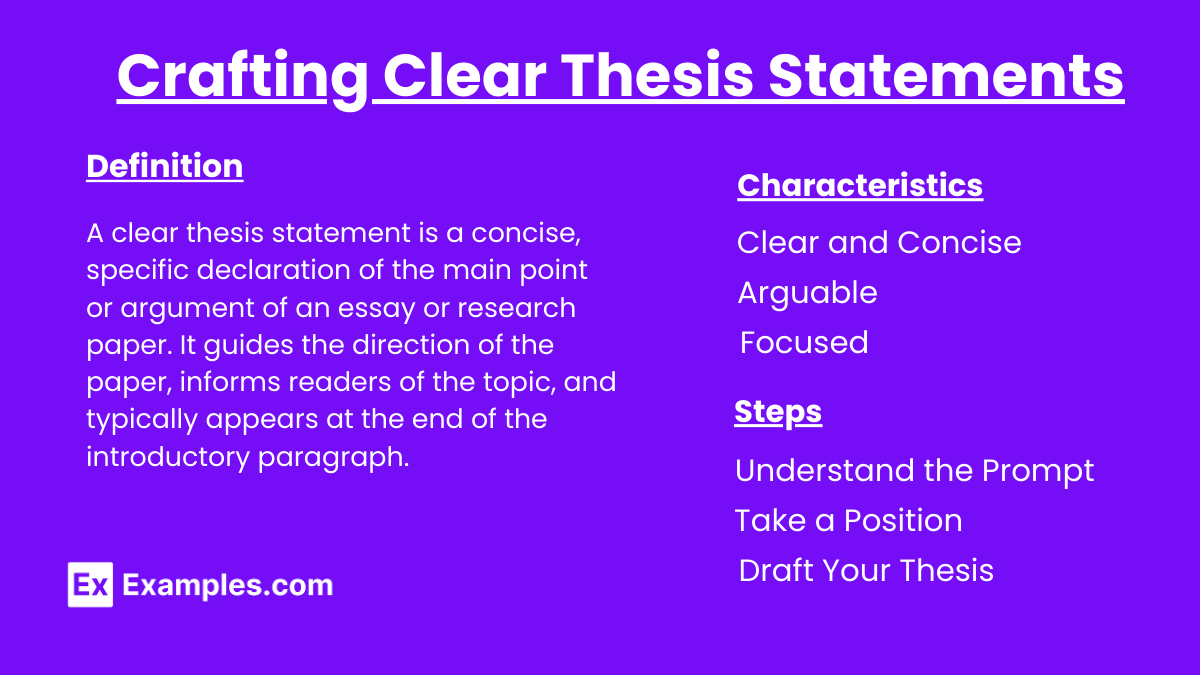Crafting clear thesis statements is essential for success in essay writing, whether you're tackling a rhetorical analysis essay, persuasive essay, or narrative essay. A strong thesis statement forms the backbone of AP English Language and Composition assignments, guiding the direction and focus of your argument. This guide will help you master the art of creating effective thesis statements for various types of essays, ensuring your writing is precise and impactful.
Free AP English Language and Composition Practice Test
Learning objectives
Understand prompt analysis, develop specific and arguable thesis, ensure clarity and focus, avoid common pitfalls, and align thesis with essay structure.
What is a Thesis Statement?
A thesis statement is a single sentence that summarizes the main point or claim of your essay. It guides the direction of your writing and informs the reader of your position on the topic.
Characteristics of a Strong Thesis Statement
Clear and Concise
Specific, Direct.
Arguable
Debatable, Not a Fact.
Focused
Scope, Relevance.
Steps to Craft a Clear Thesis Statement
Understand the Prompt
Analyze the Task, Identify Key Terms.
Take a Position
Decide Your Stance, Be Specific
Draft Your Thesis
Combine Your Position and Reasons, Keep It Concise.
Examples of Strong Thesis Statements
Weak: "There are some negative and positive aspects of social media."
Strong: "Social media negatively impacts mental health by fostering comparison and perpetuating cyberbullying."
Weak: "Shakespeare’s plays are interesting."
Strong: "In 'Hamlet,' Shakespeare explores the complexity of human emotion through the protagonist’s internal conflict and moral ambiguity."
Weak: "Climate change is bad."
Strong: "Climate change poses a significant threat to biodiversity, as evidenced by rising extinction rates and habitat loss."
Refining Your Thesis Statement
Be Specific and Precise
Avoid Generalizations, Clarify Your Argument.
Ensure It’s Debatable
Test It.
Align with Your Essay Structure
Consistency, Flow.
Common Pitfalls to Avoid
Too Broad: "Pollution is bad for the environment."
Better: "Industrial pollution significantly contributes to global warming, threatening ecosystems and human health."
Too Vague: "Education is important."
Better: "Access to quality education improves economic opportunities and fosters social equality."
Too Complex: "While many believe that technology is beneficial, it has numerous drawbacks such as privacy invasion, social isolation, and the potential for misuse, which ultimately outweigh its benefits."
Better: "Despite its benefits, technology’s drawbacks like privacy invasion and social isolation outweigh its advantages."
Conclusion
Crafting clear thesis statements is crucial for success in AP English Language and Composition. A strong thesis guides your essay, making your argument clear and compelling. By understanding the prompt, taking a specific position, and ensuring your thesis is arguable and focused, you can effectively communicate your main argument and set the stage for a persuasive essay.


